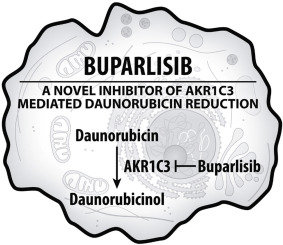Chemico-Biological Interactions ( IF 4.7 ) Pub Date : 2019-01-28 , DOI: 10.1016/j.cbi.2019.01.026 Neslihan Bukum , Eva Novotna , Anselm Morell , Jakub Hofman , Vladimir Wsol

|
Buparlisib is a pan-class I phosphoinositide 3-kinase (PI3K) inhibitor and is currently under clinical evaluation for the treatment of different cancers. Because PI3K signalling is related to cell proliferation and resistance to chemotherapy, new therapeutic approaches are focused on combining PI3K inhibitors with other anti-cancer therapeutics. Carbonyl-reducing enzymes catalyse metabolic detoxification of anthracyclines and reduce their cytotoxicity. In the present work, the effects of buparlisib were tested on six human recombinant carbonyl-reducing enzymes: AKR1A1, AKR1B1, AKR1B10, AKR1C3, and AKR7A2 from the aldo-keto reductase superfamily and CBR1 from the short-chain dehydrogenase/reductase superfamily, all of which participate in the metabolism of daunorubicin. Buparlisib exhibited the strongest inhibitory effect on recombinant AKR1C3, with a half-maximal inhibitory concentration (IC50) of 9.5 μM. Its inhibition constant Ki was found to be 14.0 μM, and the inhibition data best fitted a mixed-type mode with α = 0.6. The same extent of inhibition was observed at the cellular level in the human colorectal carcinoma HCT 116 cell line transfected with a plasmid encoding the AKR1C3 transcript (IC50 = 7.9 μM). Furthermore, we performed an analysis of flexible docking between buparlisib and AKR1C3 and found that buparlisib probably occupies a part of the binding site for a cofactor most likely via the trifluoromethyl group of buparlisib interacting with catalytic residue Tyr55. In conclusion, our results show a novel PI3K-independent effect of buparlisib that may improve therapeutic efficacy and safety of daunorubicin by preventing its metabolism by AKR1C3.
中文翻译:

Buparlisib是由aldo-keto还原酶1C3介导的新型柔红霉素还原抑制剂
Buparlisib是一种泛I类磷酸肌醇3激酶(PI3K)抑制剂,目前正在临床评估中,用于治疗不同的癌症。由于PI3K信号传导与细胞增殖和对化学疗法的抗性有关,因此新的治疗方法集中于将PI3K抑制剂与其他抗癌治疗药物结合使用。减少羰基的酶催化蒽环类药物的代谢解毒并降低其细胞毒性。在目前的工作中,测试了buparlisib对六种人类重组羰基还原酶的作用:醛糖酮还原酶超家族的AKR1A1,AKR1B1,AKR1B10,AKR1C3和AKR7A2,短链脱氢酶/还原酶超家族的CBR1其中参与柔红霉素的代谢。Buparlisib对重组AKR1C3表现出最强的抑制作用,9.5μM的50)。发现其抑制常数K i为14.0μM,并且抑制数据最适合α= 0.6的混合型模式。在用编码AKR1C3转录本的质粒转染的人结直肠癌HCT 116细胞系中,在细胞水平上观察到了相同程度的抑制(IC 50 = 7.9μM)。此外,我们对buparlisib和AKR1C3之间的柔性对接进行了分析,发现buparlisib可能占据辅因子结合位点的一部分,最有可能是通过buparlisib的三氟甲基与催化残基Tyr55相互作用而实现的。总之,我们的结果显示了不依赖于PI3K的新药buparlisib可能通过阻止AKR1C3代谢来提高柔红霉素的疗效和安全性。































 京公网安备 11010802027423号
京公网安备 11010802027423号